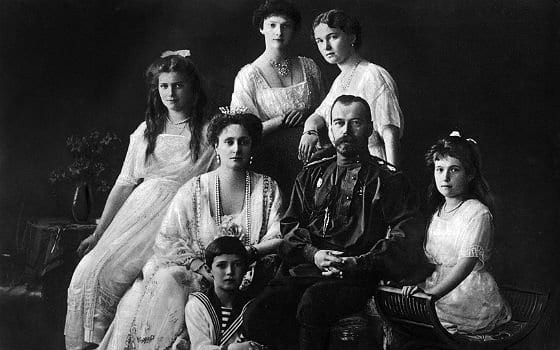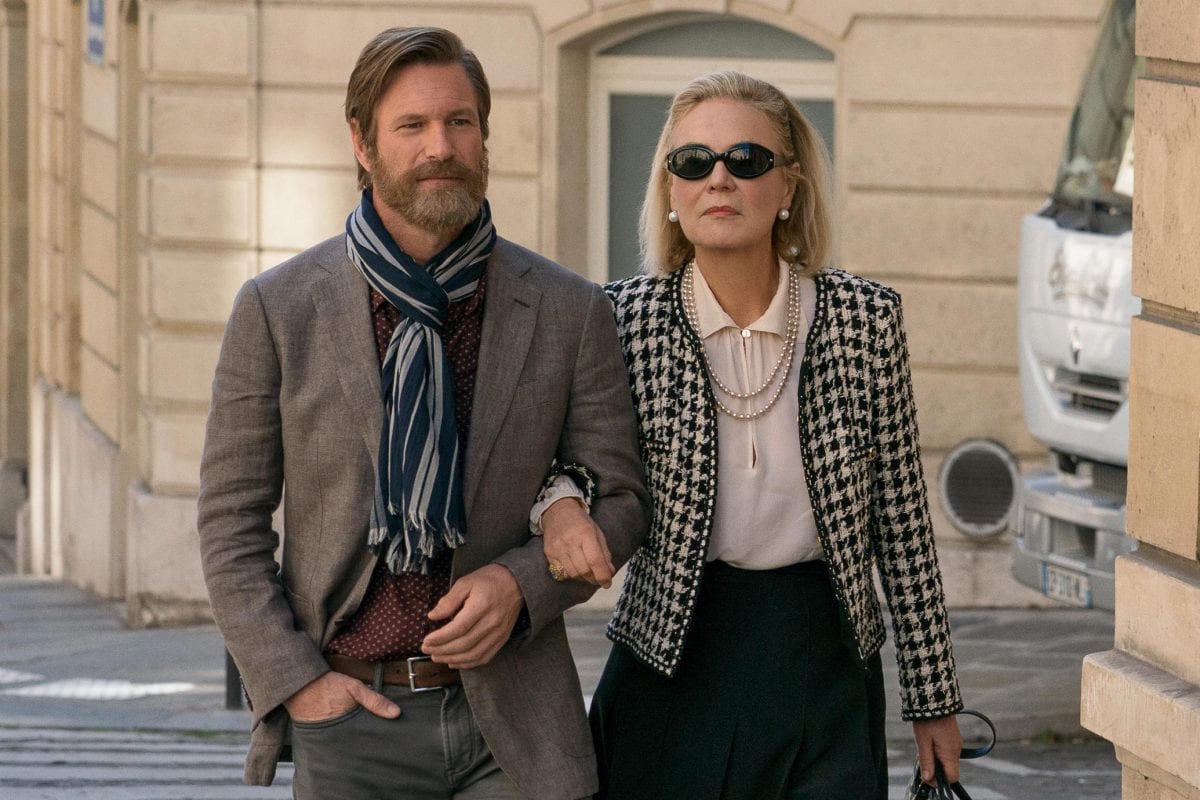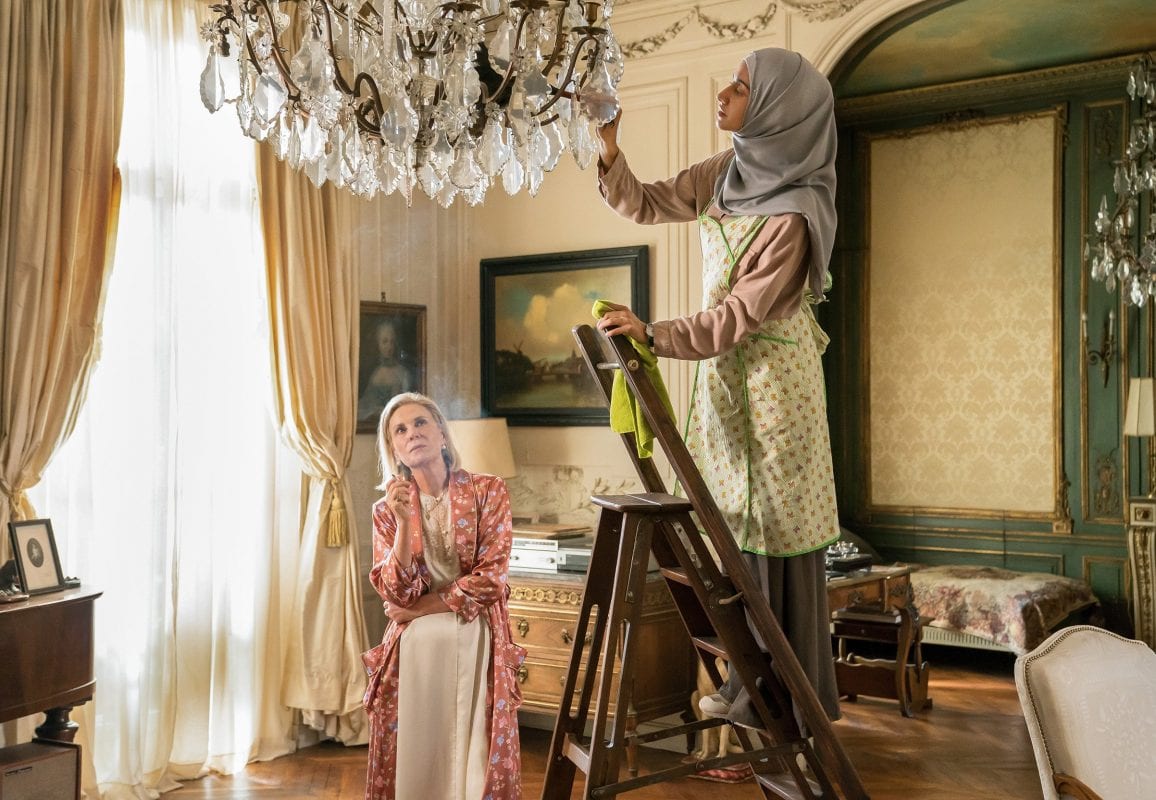Our coverage of the 8-part Amazon Prime series The Romanoffs from Mad Men creator Matthew Weiner begins with two back-to-back roundtables between Caemeron Crain and Lindsay Stamhuis. Contains spoilers for Episode 1 “The Violet Hour”.
LS: I can’t speak for everyone but I didn’t know what to expect walking into this. Until about three days ago, I didn’t even know that these were going to be wholly separate episodes with no character crossovers (yet, anyway). But I had watched Mad Men and I like Matt Weiner, and one of the most memorable parts of that show was its opening title sequence…so I guess I wasn’t surprised to see that again here. What were your thoughts about the credits?

CC: Well, basically, I love them. When I was digging into the history a bit over the past weeks in anticipation of the show, I found myself wondering if they would actually show scenes from the past, and hoping that they would somehow; in particular the killing of the Romanov family, since the accounts are that it was really a mess and so on. Then I hit play and was delighted to find that I got it immediately, along with the ambiguity of maybe Anastasia getting away, which I thought the Tom Petty song (“Refugee”) was also putting a point on. And the style just grabbed me too, I guess. What did you think about them?
LS: Yeah, that’s kind of my thinking too—I wanted to know how they were going to tie the actual history into this modern day descendants story. So seeing it play out like this right at the top of each episode was great. I do want to know how they’re going to square away the facts of it all, though. Yes, there are descendants of the Russian royal family still living today but they aren’t descended from the Tsar and Tsarina. So are all these characters going to be claiming to be related to “The One That Got Away”? From the looks of things, at least from the two episodes we’ve had so far, the answer is ambiguous. It probably doesn’t even matter anyway. The point seems to be about this presumption of royal lineage and heritage and what that looks like in modern day Paris, or in suburban Ohio. I can dig it.
CC: Yeah, it definitely seems to me like they are just leaving that ambiguous, or something like that. I’m not sure if ambiguity is quite the right word. It is more like how things stand with Anna Anderson. It’s not really ambiguous in that DNA testing has pretty definitively proven that she was not Anastasia Romanov, and indicated that all members of Nicholas II’s immediate family died, but still people question that, so it is more like a conspiracy theory, or urban legend or something like that.
I don’t think they are going to “square away the facts of it all” is I guess what I am saying. It’s not clear if these people are claiming to be direct descendants, or just part of the broader bloodline. So far, at least; we’ll see what happens in further episodes.
And I think the last thing you said about what it looks like for people to presume to have a royal lineage in these differing contexts is on the mark. It appears that the stories are going to be really distinct from one another, though I hold out some hope for connections, or at least resonances, between them. So, let’s talk about the first one: “The Violet Hour”—what struck you about this episode?

LS: One thing really stuck out for me: we saw some very pointed political plot points being made around xenophobia in France. That you have a wealthy Romanov descendant, Anushka (Marthe Keller), living in a grand apartment in the shadow of the Eiffel Tower whose caretaker is a young Muslim woman named Hajar (Inès Melab) could have been played in a lot of ways but I actually found myself shocked at some of the things that Anushka says to Hajar! I have friends who are Muslim who live in Paris and they say things really are that bad sometimes, but you rarely see that depicted on TV unless it’s the news. So that struck me hard. What about you?
CC: Yes, definitely that, but as an American it also got me thinking about putting that in the French context. I mean, we have an unfortunately large amount of this kind of Islamophobic sentiment here, but the expression of it through the lens of French culture/her aristocratic demeanor in general created a certain kind of distance (for me, at least) that opened up the space for me to experience some humor in these scenes. Like the thing with the croissant—this is very sophisticated bigotry. (I looked it up, by the way, and the story she tells seems to be a widespread myth). It’s terrible, of course, but I felt like the French context allowed them to make it more hyperbolic than an American one would, while at the same time remaining realistic, if that makes sense.
There is more to talk about with regard to their relationship, of course, but it sounds like you were struck in a different way by some of this stuff? Is it wrong that I laughed, e.g., when Anushka shut the door and kind of ran away as soon as she saw Hajar in her hijab standing there?
LS: No, I think you’re absolutely right to point out the hyperbolic nature of it because that’s exactly what they were going for (I think, anyway). It’s not something to laugh at…but the way it’s presented, you can’t help but laugh. And I agree it’s because of the distance but also the ridiculousness of it. The class structure—which is commented on by Greg (Aaron Eckhart) and Sophie (Louise Bourgoin) and their friends in the dinner party, so you know Weiner was thinking about it and wanted us to think about it too—allows for this kind of thing. Those of us who live outside of it can see it for what it is: vacuous and desperate. I mean, Anushka calls herself a refugee living in exile even though she’s never been to Russia. It informs the way she looks at Hajar, too. They’re really not all that different. But Anushka has this completely bizarre notion of herself and how she fits into the world, how she performs that entire idea of noblesse oblige in the modern world. It’s fascinating. I do wonder how this plays out for viewers in France, though. Would love to find out…

CC: Yeah, I am curious about that, too. And it definitely related to her haughtiness and, well just her whole thing; I guess. The class dimension is definitely relevant, along with the way she is taking herself as a victim even though she is incredibly privileged. I want to say that is what I was laughing at.
And, in contrast, Hajar is heroic in her patience with her. I thought that was really nice. They ended up building something through their relationship that helped to humanize Anushka as the episode went on, without ever getting rid of her central pretentiousness.
LS: Which is exactly why I loved the ending of this episode so much. Because in a bizarre way it was entirely true to Anushka’s character that she would react to Greg and Hajar’s news in such a way. And yet I was fully prepared for her to lose her mind and die. It was a subtle subversion of expectation and I loved it so much.
CC: I agree about that. I was less of a fan of some of the things leading up to it. For whatever reason, when Greg and Hajar were on their “date”—which, of course started with him attempting to get her to not accept the apartment and so on—I was pretty actively hoping against them hooking up. I loved their rapport and everything, I was just kind of hoping they wouldn’t make it romantic. Maybe that’s just me. Thankfully, when it came down to it, it didn’t feel forced, though. I actually really liked the moment when he asks if he is allowed to kiss her and she says no before kissing him, though I have some nebulous worry about the power dynamics still, I guess.
I also kind of groaned when they went to the “oh no she’s pregnant” trope, but I suppose that was more about it feeling cliched or something than anything else, and the ending you mentioned made it worth it. Despite all of the stuff we’ve talked about, Anushka was happy that the bloodline would continue, and that trumps everything else.
Sophie didn’t want to have kids, after all. We should talk about her a little bit, too, though. I am actually kind of Team Sophie, I think.
LS: I literally agree with everything you said. Every single thing. The walk along the Seine…the oh-no-we’re-getting-too-chummy almost kiss beside Notre Dame…the skinned knee…the moped jaunt that literally takes them all over Paris in every direction just so that we get to see the pretty buildings and landmarks…all that pre-hookup stuff had me rolling my eyes pretty hard. There were things that kept it fresh, yes, but those things came with price tags I’m not sure this series was willing or able to deal with—the possible power dynamic being one of them.
And yes, Sophie…whom we haven’t really talked about yet. She’s shrewish and mean, and her cobwebby uterus is used as one of the go-to reasons for Anushka’s hatred of her, and I couldn’t help but think that we were meant to equate the two: Sophie is the way she is because her babymaker is unemployed, to use Anushka’s phraseology. As much as I didn’t like Sophie and did like Hajar as individual characters, the fact that beautiful, fertile Hajar is held up as the radiant Mother figure in the final tableau while Sophie stalks away in her leather pants with the fake Faberge egg (her eggs aren’t real! She’s never going to have children!)…it rankles.
CC: Maybe I am just weirdly drawn to defending strong women who are portrayed unsympathetically, like Skyler in Breaking Bad or Sigourney Weaver’s character in Working Girl—but, again, part of this is about me. Sophie is largely the kind of woman I am attracted to, and maybe let’s not talk any more about that. You’re right, though, maybe she does have that haughtiness; that’s not attractive.
LS: We’ve learned so much about one another tonight, eh Caemeron? Well, I guess I’d round off the chat here by saying that I walked into this episode with absolutely zero expectations and I was so very pleasantly surprised that I didn’t even wait before I started Episode 2. I’m so curious to see how the rest of the series plays out.
CC: Same. I can’t say I didn’t have expectations, though. Mad Men set a pretty high bar. But I was unsure whether I would like The Romanoffs or not, and I’m glad that it seems that I do. Though, every episode being wholly distinct from the others does make it an uncertain proposition!


Glad I surfed in after watching the show. Exactly what I needed, Sometimes it felt like “Before Sunrise” — the work of a kind soul.